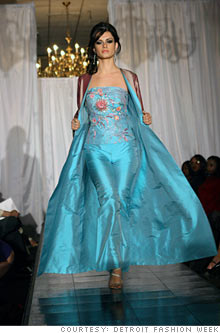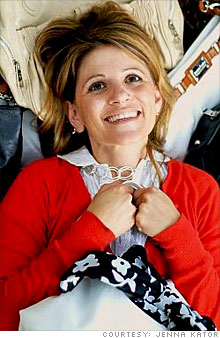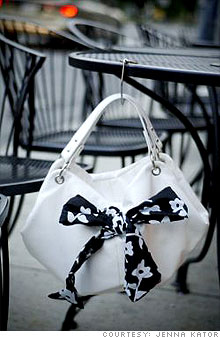Detroit swap: Auto plants for fashion showrooms
Detroit has skilled manufactures and a unique industrial design sensibility -- strengths city planners are tapping as they try jumpstart a local fashion industry.
 |
| At Detroit Fashion Week's runway shows, local designers show off their creations. This year's show takes place on Saturday. |
 |
| Jenna Kator launched a handbag line after she was laid off from her job as an automotive media buyer. |
 |
| Kator's bags are all named after Michigan cities. Pictured here is the Troy. |
 |
| William Malcolm left a job in financial services to launch a luxe line of custom-made men's suits. |
DETROIT (CNNMoney.com) -- Detroit's auto industry trained generations of workers in design and manufacturing. As that business fades and its jobs disappear, city planners are hoping to redeploy the city's creative minds and craftsmen toward a new and growing field: fashion.
They may seem like wildly different industries, but cars and clothes have elements in common, Detroit fashion insiders say. The city's industrial history gives it a unique design sensibility, and its manufacturing capabilities play well to a growing demand for garments that are made in America.
"Car designers are very aware of fashion, and they understand the principles of design," says Joe Faris, a metro Detroit resident and senior designer for Schott N.Y.C. "Creative people are just creative -- it can be applied both ways."
"I think that Michigan is a key spot for a fashion industry to start and to blossom, says Brian Heath, founder and producer of Detroit Fashion Week. "We're ready."
Scheduled in tandem with New York's fashion week, Detroit Fashion Week started in 2005 to spotlight up-and-coming local designers. After several days of networking functions for the fashion community, this year's event will finish with a fashion show Saturday night inside the Royal Oak Farmers Market.
Heath has traveled around the world for his work as a fashion photographer, and launched Detroit Fashion Week to help build the industry in Michigan. He's hopeful that events such as his will encourage national retail buyers to feature Michigan fashion labels in their stores.
Detroit's low overhead costs make it a good spot for experimental entrepreneurs. "Michigan is more approachable for a designer who wants to be able to afford housing and also run a business and make a profit," Heath says.
The city also features a unique advantage: A skilled manufacturing workforce. Faris, a former contestant on Project Runway, sees the area as prime ground for a fashion boom. "The auto industry has a huge pool of incredibly talented and creative people that are just waiting to be tapped into," Faris says.
People like Jenna Kator, who launched a handbag line after she was laid off from her job as an automotive media buyer in January. She'll be showing off her Jenna Kator Collection at the Detroit Fashion Week show. Each bag in the line is named after a Michigan city.
"Everyone thinks of Detroit as automotive. We need to be known for more than that," Kator says.
Local development officials view fashion as a key field to nurture. Artistic businesses can help diversify the local economy, but they also draw the kinds of young, educated workers Detroit needs, says Tammy Carnrike, COO of the Detroit Regional Chamber. Detroit routinely loses its young adults to cities with already thriving creative communities, such as New York City, Los Angeles and Chicago -- an exodus city planners would like to stop.
"Creative industries build a vibrant community that young professionals want to live in," Carnrike says.
Detroit natives are trying to nudge that transformation along. Faris is the creator of Fashion In Detroit, a high-end runway show scheduled for Oct. 1 and 2 at the Detroit Zoo.
With an entry fee of $2,500 (compared to Detroit Fashion Week's $350 fee), the inaugural show has lured in some nationally recognized figures, including Betsey Johnson and Kid Rock, who will show his Made In Detroit clothing line.
"My main goal is to put a fashion spotlight on Detroit -- make people turn a few heads and see Detroit is a vibrant city and has more to offer," Faris says.
Faris and Heath discussed the possibility of holding Detroit Fashion Week and Fashion In Detroit in the same week, but decided to schedule them separately. Both organizers say there is a place for two Detroit fashion events, since they will showcase different types of designers.
Of course, a few ambitious designers will be participating in both. William Malcolm, CEO of William Malcolm Luxe Collection, is double-dipping.
Malcolm designs men's suits based on ones worn by actors in the 1930s and 1940s. He has his suits custom-made for each customer, then ships them gift-wrapped with a CD burned with music he believes fits the mood of the suit. Malcolm left a stable job in the financial services and insurance industry almost two years ago to start his line, which launched its first collection in May.
He's done well enough that he hopes to hire two employees in the near future. Malcolm believes his label is gaining steam because of its craftsmanship and because Detroit's fashion scene has less competition than larger markets -- something he says helps him to stand out.
While the local economy has been worrisome at times, Malcolm believes Detroit can make a name for itself in the fashion world, and use the industry to create jobs and spread positive news about the city.
"Michigan is not dead -- I don't care what people say," Malcolm says. "If you want to do something, you'll make it happen in any economy." ![]()
-
The Cheesecake Factory created smaller portions to survive the downturn. Play
-
A breeder of award-winning marijuana seeds is following the money and heading to the U.S. More
-
Most small businesses die within five years, but Amish businesses have a survival rate north of 90%. More
-
The 10 most popular franchise brands over the past decade -- and their failure rates. More
-
These firms are the last left in America making iconic products now in their twilight. More








